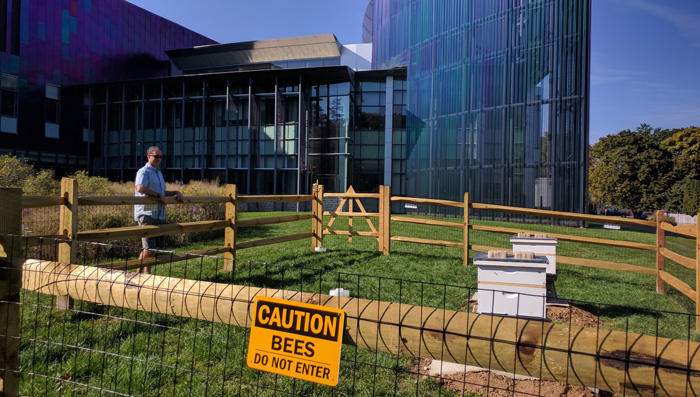Buzzworthy

"I started keeping bees with friends because we were concerned with the plight of pollinators and the potential ramifications for our agricultural systems," says Marcus Welker, projects coordinator for the Center for Sustainability Education (CSE), seen here at the new bee hives behind Rector. Photo by Tony Moore.
The Hive beekeeping cooperative installs beehives on campus
by Tony Moore
Behind the Rector Science Complex, behind a thick wall of wildflowers, behind a low fence meant to keep people from accidentally wandering in, two beehives have been installed, now surrounded by small swarms of bees and a dull buzz.
They represent the beginning of an era: beekeeping on campus, an initiative spearheaded by Dickinson’s new beekeeping cooperative, dubbed The Hive.
It all started about a year ago, when Rowan Price '18 and John Leibundgut '18 approached Marcus Welker, projects coordinator for the Center for Sustainability Education (CSE), about starting some beehives on campus. Welker learned to bee-keep in graduate school, and the practice was on his mind when he joined Dickinson in 2015, so the request was music to his ears.
"I like working with bees because it improves the sustainability of my local community and enables me to learn more about insects, the ecology of my region and my local economy," he says. "And it enables me to do important hands-on work alongside students, staff, faculty and community members." CSE sees The Hive serving as a living laboratory for learning about sustainability problems and solutions through direct experience.

Marcus Welker, in blue, assists in the installation of the hives, as members of CSE look on. Photo by Carl Socolow '77.
The bees summered in Harrisburg and were brought to campus in September, and now they’re at the end of their season. Ten thousand or so will hibernate until the weather warms up, and when the hives get going again through the spring and summer, and the queen starts laying eggs, upward of 50,000 bees will call campus home. Then Welker hopes the community will begin interacting with the bees.
“One of the things we've been working on is a set of training modules that participants—who could be students, staff or faculty—would be able to go through,” he explains, noting that there is a video on The Hive’s website that serves as a good warmup. “It would give them a basic understanding of the things that we do, the safety practices around keeping bees, some of the basics of keeping bees.” (The basics also can be learned at a Nov. 16 kickoff event; see below for details.)
Welker also would like to get participants building more hives over the long winter months.
“Students sometimes have a hard time seeing how small projects they work on contribute to the whole of sustainability for the college and in the world,” Welker says, noting that bees' large role in maintaining ecosystems might not be apparent to the uninitiated. “But going to the shop, building parts, learning how to build something—that hands-on stuff is really tangible for people.”
That maintenance and upkeep represent most of the interaction to be had with the bees at this point, and it’s dictated by the season, but The Hive will come alive in the spring. Members are currently completing online training and will spend the winter months planning honey harvest logistics, candle and soap-making workshops and pollinator-friendly education programs.

Beekeeping comes with its own gear, such as these protective suits. Photo by Lindsey Lyons.
“Our goal isn’t to conduct research, but I think there are opportunities for lots of different classes to use the bees for classroom learning,” Welker says. “If there are people interested in engaging the borough, engaging the college's policymakers, exploring pesticide use or plant management, there's that whole side of things that people can become active in. ... I'm hoping and willing to engage students in some of those other types of projects as people become interested.”
To provide more information for the Dickinson community, CSE will host a Sustain It workshop on The Hive November 16, 2016, 11:30-12:30, in the HUB Social Hall.
Learn more
Published October 31, 2016